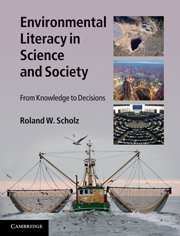Book contents
- Frontmatter
- Contents
- Boxes
- Acknowledgments
- International praise for Environmental Literacy in Science and Society
- Preamble
- Overview: roadmap to environmental literacy
- I Invention of the environment: origins, transdisciplinarity, and theory of science perspectives
- II History of mind of biological knowledge
- III Contributions of psychology
- IV Contributions of sociology
- V Contributions of economics
- 10 Origins of economic thinking and the environment
- 11 Contemporary economic theories dealing with the environment
- VI Contributions of industrial ecology
- VII Beyond disciplines and sciences
- VIII A framework for investigating human–environment systems (HES)
- IX Perspectives for environmental literacy
- Glossary
- References
- Index
10 - Origins of economic thinking and the environment
from V - Contributions of economics
Published online by Cambridge University Press: 05 August 2012
- Frontmatter
- Contents
- Boxes
- Acknowledgments
- International praise for Environmental Literacy in Science and Society
- Preamble
- Overview: roadmap to environmental literacy
- I Invention of the environment: origins, transdisciplinarity, and theory of science perspectives
- II History of mind of biological knowledge
- III Contributions of psychology
- IV Contributions of sociology
- V Contributions of economics
- 10 Origins of economic thinking and the environment
- 11 Contemporary economic theories dealing with the environment
- VI Contributions of industrial ecology
- VII Beyond disciplines and sciences
- VIII A framework for investigating human–environment systems (HES)
- IX Perspectives for environmental literacy
- Glossary
- References
- Index
Summary
Chapter overview
This chapter starts with a discussion of economic thought in antiquity, including not only the use of the term economics, but also many important economic ideas that were coined at that time. We then discuss how markets and agriculture were understood and regulated in the preclassical idea of economics. From the perspective of the human–environment complementarity, economic transactions can be thought of as a transfer of ownership of parts of the material–biophysical–technological environment among human systems. There are properties or estates that are owned by individuals, groups, families, organizations (e.g. companies or cooperatives), communities, nations or other human systems. These properties serve to maintain productivity, and are of interest to other human agents.
We discuss origins of the thinking about exchange, selling, and trading. Trade emerged in societies in which not everybody is a “jack of all trades.” Sometimes specialized techniques, tools or scarce materials had to be acquired or bought from outside the family, reminding us how access to certain natural resources is essential.
After dealing with economic thought in the agrarian society, in which land played a key role, the journey through economics in this book then passes through the entrance door into modern economics, which is Adam Smith’s magnum opus on An Inquiry into the Nature and Causes of the Wealth of Nations (when the resource is fixed in absolute size but extraction costs rise with the rate of extraction; Smith, 1776/1961). We discuss Thomas R. Malthus’ theory on the shortage of natural resources and Ricardo’s land rent theory. We see how labor, land, and capital become fundamentals of economics and learn how Marx considered negative collaterals of the industrial society. We can then see how marginal-utility theory and modern concepts such as willingness-to-pay entered neoclassical economics and how welfare theory and the accounting of external effects and environmental damage became parts of economics.
- Type
- Chapter
- Information
- Environmental Literacy in Science and SocietyFrom Knowledge to Decisions, pp. 257 - 280Publisher: Cambridge University PressPrint publication year: 2011



